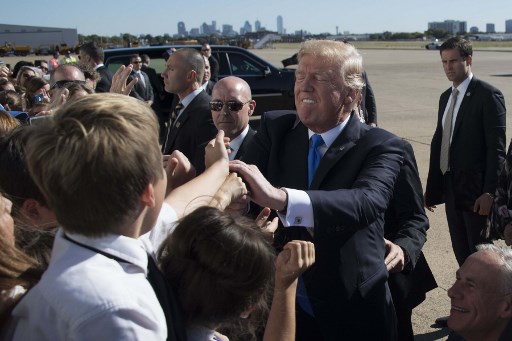
WASHINGTON, United States (AFP) – President Donald Trump hit back at critics within his own party Wednesday, painting them as outliers in what is otherwise a “love fest” between him and Republican lawmakers.
A day after Republican senators Jeff Flake and Bob Corker described Trump as having a “flagrant disregard” for truth and decency and of “debasing” the nation, the combative president shot back.
Trying to forestall a broader party backlash, Trump tweeted that Flake and Corker were resigning because they had “zero chance of being elected,” and insisted his meeting with lawmakers on Capitol Hill a day earlier had been a resounding success.
“The meeting with Republican senators yesterday, outside of Flake and Corker, was a love fest with standing ovations and great ideas for USA!” he continued.
Trump’s allies cheered Flake’s departure as an unbridled victory for their effort to take over the party and a “monumental win for the entire Trump movement.”
It “should serve as another warning shot to the failed Republican establishment that backed Flake and others like them that their time is up,” said Andy Surabian, a former Trump White House advisor.
Still, while the departure of the two senators may ultimately play to Trump’s advantage, both will remain in Congress for more than a year and will be less likely to fall in line behind the White House on key votes.
No room for defections
Trump had already faced a difficult task of mustering 51 votes to pass tax cuts, an effort that appears to be the glue holding the party together.
There are currently 52 Republican senators, so more than one defection would hamper reform efforts, unless Democrats can be brought on board.
It is also far from clear that more hardline Republican candidates can beat Democrats in places like Flake’s native Arizona, where Trump campaigned hard in 2016 yet won by less than four percentage points.
Many Republicans see Trump’s presidency as the best way to enact long-standing goals like tax reform and cutting the size of government, and the White House has worked hard to keep the rank and file focused on those targets amid rolling scandals and failed attempts to pass legislation.
“Working hard on the biggest tax cut in U.S. history. Great support from so many sides. Big winners will be the middle class, business & JOBS,” Trump also tweeted Wednesday.
“I’ll tell you what, honestly, the Republicans are very, very well united,” he said.
The White House points to the president’s solid approval ratings among Republican voters as evidence that his brand of politics should dominate the party.
According to an Economist/YouGov Poll, 84 percent of Republican voters approve of the way Trump is handling his job as president.
‘Not a watershed’
Against that backdrop many Republicans privately express grave misgivings about Trump’s behavior in office, but remain publicly supportive.
“Parties always have their disagreements. Look no further than Bernie Sanders and Hillary Clinton in the Democratic Party. That’s just part of party politics,” Senator Steve Daines told AFP.
Political science professor Larry Sabato said Flake’s attack on Trump was a “beating” for the president, but is “not going to be a watershed.”
“I always tell people JFK’s book ‘Profiles in Courage’ was a very slim volume.”
Yet there is no doubt that Flake and Corker’s comments have exposed a simmering battle for the soul of the Republican party.
Establishment conservatives — who have managed since 2007 to co-opt waves of populist and nationalist party insurgents — have struggled to retain control since Trump’s election.
Senator Marco Rubio admitted the party “is going through a moment of realignment internally.”
He cited “an internal debate about what the party is going to be about, what it’s going to represent in the years to come. So is the Democratic Party. And by the way, so is every institution in America.”
© Agence France-Presse







